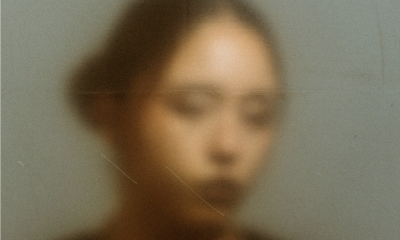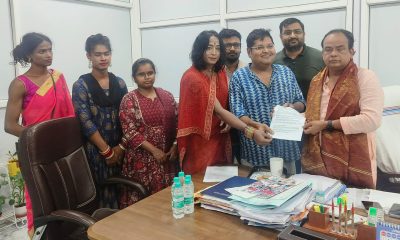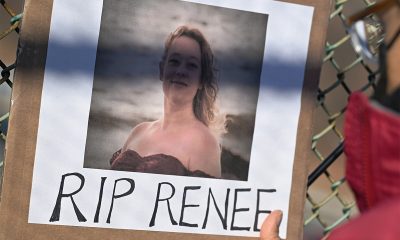India
Narendra Modi to form coalition government after party wins India election
LGBTQ issues largely absent from campaign
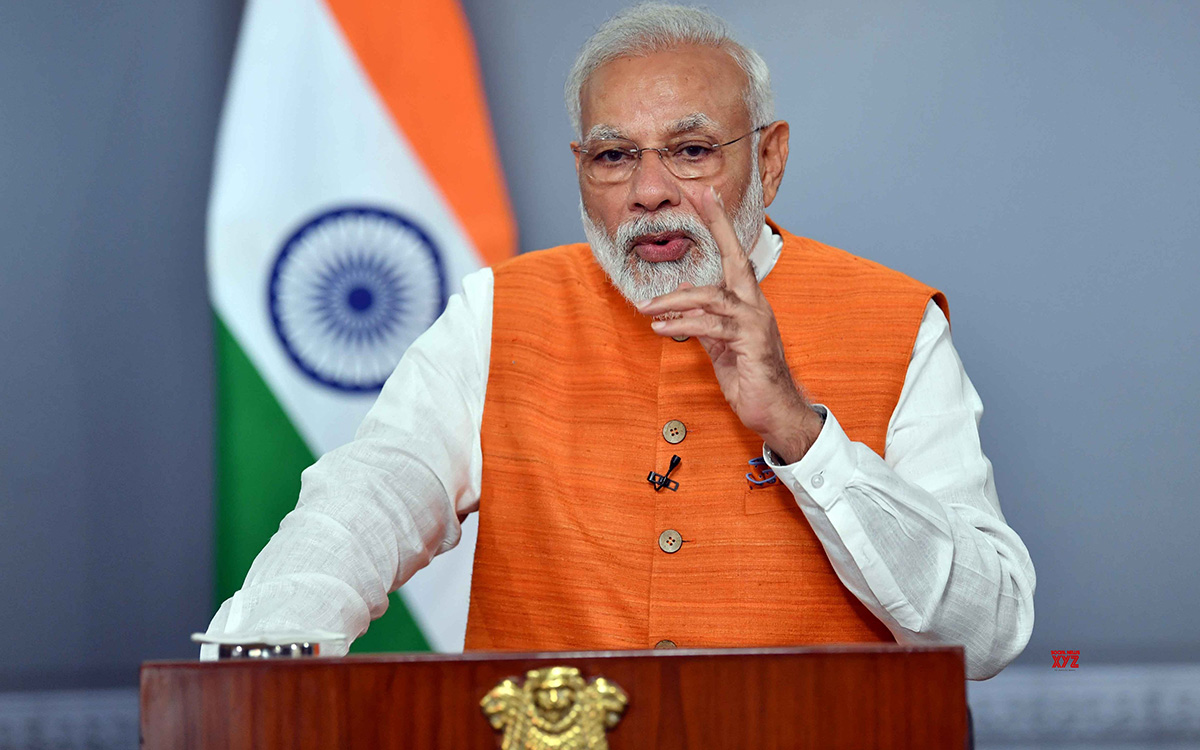
In a vibrant democracy like India, the anticipation surrounding election results is always palpable.
On Tuesday, the stakes were incredibly high, especially for the LGBTQ community. The air was thick with suspense, and social media platforms buzzed with the anxiety and hopes of millions. As the night wore on, discussions flourished, emotions ran high, and the country collectively held its breath. The results, which trickled in at their own unhurried pace, promised to shape the future landscape of India’s social and political climate.
The Election Commission on Tuesday announced the much-awaited results.
The Bharatiya Janata Party, led by its charismatic leaders, not only retained power but also strengthened its position with a clear majority. With 293 seats, the coalition comfortably surpassed the majority mark, ensuring a third consecutive term for Prime Minister Narendra Modi.
Despite supporters’ hopes and high expectations for a resounding victory, the election results did not fully meet their aspirations. This sense of disappointment was palpable, especially considering the extensive campaigns and efforts made ahead the elections.
All the regional and national parties came together, forming the formidable Indian National Developmental Inclusive Alliance to challenge the Modi-led National Democratic Alliance. This INDIA alliance, a vibrant coalition of 34 parties, stood united, mostly in opposition to Modi’s policies and leadership.
The BJP has recently articulated its position on LGBTQ rights in India.
The government’s opposition to marriage equality in the Supreme Court highlighted their stance against nuptials for same-sex couples. By acknowledging the commitment made by the Supreme Court on issues faced by the LGBTQ community, however, the government did establish a dedicated committee to address them.
This committee, formed in April and chaired by Cabinet Secretary Rajiv Gauba, aims to address critical concerns that include healthcare access, pension entitlements, and property rights for LGBTQ people.
The inclusion of secretaries from various key ministries signifies a comprehensive approach to addressing these multifaceted challenges. The committee’s creation also underscores the government’s recognition of the LGBTQ community’s unique needs and its commitment to ensuring their rights and well-being are systematically addressed.
Despite their alliance, the opposition parties approached the election with individual manifestos rather than a unified platform. This disjointed strategy meant that only two of the 34 parties made explicit commitments to the LGBTQ community.
The Indian National Congress, one of the major opposition parties, promised to introduce a bill that would recognize LGBTQ couples’ civil unions. The Communist Party of India (Marxist) also pledged to enact pro-LGBTQ laws and underscored the need for legislative measures to protect and promote the rights of LGBTQ people.
The LGBTQ community throughout the election campaign found itself largely overlooked in the opposition parties’ public discourse. LGBTQ rights were conspicuously absent from Indian National Congress leaders’ campaign speeches, despite the promises they made in their platforms.
Rahul Gandhi, the prominent Indian National Congress figurehead, failed to address LGBTQ rights in his speeches, even in Uttar Pradesh and other states with significant LGBTQ populations.
Twenty-eight percent of India’s transgender population lives in Uttar Pradesh. The state, along with others with substantial LGBTQ communities, saw no mention of issues that are critically important to them during Gandhi’s rallies and public speeches.
This disconnect between the promises made in manifestos and the topics discussed on the campaign trail underscores a broader issue within political campaigning, where marginalized communities often struggle to find a voice. Despite the written commitments to LGBTQ rights, the lack of vocal support during the campaign highlights the ongoing challenges in bringing these important issues to the forefront of political debate.
Several independent LGBTQ candidates, in a remarkable display of political participation, entered the fray during election campaign. They include Sunaina Kinner, a trans woman who ran for office in Jharkand state’s Dhanbad constituency.
Kinner faced considerable challenges and lost the election.
She received 3,462 votes, a modest number in the face of entrenched political dynamics. The NOTA (None of the Above) option received 7,354 votes in Kinner’s constituency, indicating a substantial number of voters were dissatisfied with all available candidates.
The BJP’s election manifesto reflected a limited focus on the broader LGBTQ community, opting instead to highlight specific initiatives for trans people. The party has promised to improve healthcare access for them.
By promising to include trans people in health programs and offer free health insurance coverage through the prime minister’s Ayushman Bharat Scheme, the BJP aims to provide essential medical support and financial protection. This initiative could potentially improve healthcare outcomes for many trans people, ensuring they receive the necessary medical attention without the burden of financial constraints.
The brevity of the party’s mention of trans issues and the absence of broader LGBTQ legislation, however, indicates the party’s stance on LGBTQ issues.
After a key meeting of the NDA on Wednesday that the BJP led, Modi was elected party leader and will submit to President Droupadi Murmu on Friday a formal request to form the government for the third consecutive time. The INDIA alliance will sit in opposition.
Ankush Kumar is a reporter who has covered many stories for Washington and Los Angeles Blades from Iran, India, and Singapore. He recently reported for the Daily Beast. He can be reached at [email protected]. He is on Twitter at @mohitkopinion.
India
Few transgender people benefit from India’s low-income housing program
Pradhan Mantri Awas Yojana launched in 2015

The Indian government on Dec. 15 informed parliament that only one transgender person in Jammu and Kashmir has been recorded as a beneficiary under the Pradhan Mantri Awas Yojana since the housing program was launched a decade ago.
PMAY is a federal government program aimed at expanding access to affordable housing for low- and middle-income households, including through credit-linked subsidies. The parliamentary disclosure indicates that trans beneficiaries have been virtually absent from the program’s records in the union territory, despite official guidelines listing trans people as a priority category.
In a written reply to a question in the upper house of parliament, known as the Rajya Sabha, the Housing and Urban Affairs Ministry said Jammu and Kashmir recorded zero trans beneficiaries under the program in each financial year from 2020–2021 through 2025–2026, with the cumulative total since inception remaining at one.
The Indian government launched the program on June 25, 2015, and the Housing and Urban Affairs Ministry implemented it.
The parliamentary reply came in response to a question on whether trans people are being included under the housing scheme and what steps have been taken to address barriers to access. The ministry said both PMAY and its successor, PMAY 2.0, are demand-driven programs, with responsibility for identifying and selecting beneficiaries resting with state and regional governments.
The ministry said the program lists trans people as a priority group, alongside widows, single women, people with disabilities, senior citizens, and other socially disadvantaged categories. It added that actual implementation depends on housing proposals and beneficiary lists submitted by state and regional governments.
According to figures the Indian government cited, a total of 809 trans beneficiaries have been recorded under PMAY and its successor, PMAY 2.0, since the programs were launched, with the vast majority concentrated in a small number of states. The southern state of Tamil Nadu accounts for 222 beneficiaries, followed by Andhra Pradesh with 186, and Odisha with 101. By contrast, several other states and federally administered regions, including Jammu and Kashmir, have reported either negligible or no coverage. India is administratively divided into 28 states and eight federally governed territories.
According to India’s 2011 national Census, Jammu and Kashmir recorded 4,137 trans residents. The same census counted 487,803 trans people nationwide, providing the most recent official population baseline for the community in India.
The ministry also said it has not conducted a specific survey to assess barriers faced by trans communities in accessing the scheme’s benefits. Instead, it said lessons from earlier implementation phases informed the design of the second phase of the program, launched on Sept. 1, 2024, which aims to support an additional 10 million urban beneficiaries over the next five years.
The parliamentary reply reveals an even more severe gap in Ladakh, India’s northernmost federally governed territory bordering China and Pakistan-administered areas and considered strategically critical to national security.
Official records show that Ladakh has not reported a single trans beneficiary under the housing scheme, either in recent years or cumulatively since the program began, with zero coverage recorded across all financial years listed in the Annexure. By comparison, Ladakh’s trans population stands at six, according to a written submission made to the High Court of Jammu and Kashmir in 2024.
Despite trans people being listed as a priority group in the scheme’s guidelines, the federal government said that as of November 2025 it had sanctioned more than 12.2 million homes nationwide under both versions of the program, with over 9.6 million homes completed and delivered. At the same time, data from Jammu and Kashmir, Ladakh, and several other regions show little to no recorded housing uptake by trans beneficiaries.
Speaking with the Washington Blade, Meera Parida, a trans activist, former member of the National Council for Transgender Persons in India’s eastern zone, and a former state advisor under the housing and urban development department, said the 2011 Census does not reflect the full size of India’s trans population, noting that public recognition and self-identification were far more limited at the time. She pointed to later government data collection efforts, including the National Portal for Transgender Persons that the Social Justice and Empowerment Ministry launched in 2020, as evidence that official counts have expanded beyond what was captured in the last Census.
“I am surprised that around the country only over 800 people benefited from the scheme, because most of the transgender population is from socially backward classes,” said Parida. “So they do not have a house and no family. Five years have passed since the NALSA judgment and the Transgender Protection Act; even after all these, if only over 800 transgender persons got home, that is a sad situation.”
Parida said that Prime Minister Narendra Modi has publicly positioned trans people’s welfare as a priority, but argued that the issue requires greater attention at the administrative level. She said the prime minister’s office should issue clear directions to all relevant departments to ensure trans people receive housing support and that implementation moves more quickly.
“There is still widespread discrimination and stigma against the community. Many transgender people are afraid to speak openly, which is why this issue continues to persist,” Parida said. “If stigma and discrimination are not addressed seriously, the marginalized community will remain invisible and reluctant to come forward. In that situation, the government will also be limited in what it can do. State governments should work with activists and community organizations to build accurate data. The government has decided to resume the Census in 2026, but the enumerators who go door to door must be sensitized to engage respectfully with the transgender community. The government should also improve awareness of housing schemes, because many people simply do not know they exist. A single-window system is needed.”
India
India’s Jharkhand state works to improve trans people’s access to health care
People for Change working with local officials to address disparities
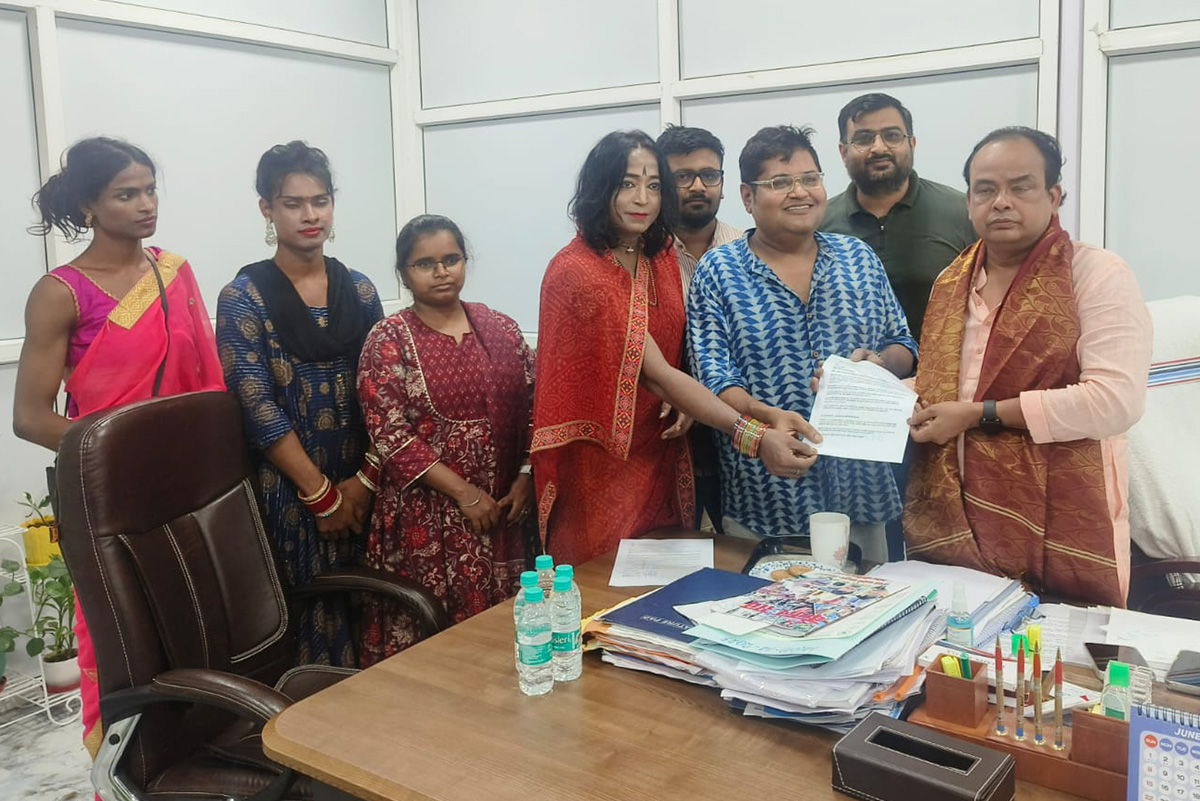
The transgender community has been part of India’s social fabric for centuries, but decades of policy neglect pushed many into poverty and inadequate health care.
The Supreme Court formally recognized trans people as a third gender in 2014, yet state-level services developed slowly. Telangana opened India’s first dedicated trans clinic, the Mitr Clinic, in 2021 with support from the U.S. Agency for International Development and Johns Hopkins University. Jharkhand State has now ordered all government hospitals and medical colleges to establish dedicated outpatient units for transgender patients.
People for Change, an LGBTQ organization, spent the past year mapping gaps in trans health care across Jharkhand. Its surveys of 100 trans residents in five districts found limited access to gender-affirming care, hormone therapy, dermatology, and mental-health services. The group followed this survey with a May 2025 consultation in Jamshedpur, an industrial town in Jharkhand, that brought together clinicians and community leaders to outline a feasible outpatient model.
Those findings were presented to Health Minister Irfan Ansari in June, backed by input from allied organizations and more than 50 trans leaders. The process helped inform the state’s decision to introduce dedicated trans outpatient departments in all government hospitals and medical colleges.
People for Change, which played a central role in shaping the policy, noted that government hospitals in Jharkhand still face infrastructure and resource gaps. Even so, the group said the order reflects a clear policy commitment to creating dedicated trans health services.
If Jharkhand’s trans outpatient departments system functions as planned, it could become a regional model for states with comparable gaps in public health access.
Government data from the 2011 Census — the latest official count to identify an “other” gender category — lists 13,463 trans residents in Jharkhand, alongside sizable populations in neighboring states: 40,827 in Bihar, 30,349 in West Bengal, 22,364 in Odisha, 18,489 in Chhattisgarh, and 137,465 in Uttar Pradesh. Though likely underreported, these figures underscore the scale of need across eastern and central India.
“The decision to start dedicated transgender OPDs (outpatient departments) is not just an administrative step — it is a statement of inclusion, a recognition that the transgender community deserves discrimination-free, dignified, and responsive healthcare. When the government takes such a deliberate step, it sets a tone for systemic change,” said Souvik Saha, founder of People for Change. “It creates an official entry point for transgender healthcare.”
“For the first time, transgender persons will have a recognized and respectful space within the public health system,” added Saha. “That itself is a major shift. It signals to doctors, nurses, and administrators that transgender health is a priority. This leads to sensitization, accountability, and the gradual improvement of attitudes within hospitals.”
Saha told the Washington Blade the policy is likely to trigger broader improvements, noting that once a service is formally notified, budget allocations, training, infrastructure, and staffing typically follow. He said the move could strengthen the system gradually, “step by step.”
“We are realistic: we know improvements won’t happen overnight. But we are also optimistic because the state has already shown genuine leadership and empathy by issuing this order,” said Saha. “And since Jharkhand is celebrating its 25th year of formation, this decision reflects the state’s intention to move towards greater equality and social justice.”
“For the transgender community, this is not just a service — it is dignity. It is visibility. It is inclusion,” he added. “And with the government, civil society, and community working together, we believe this will lead to meaningful and lasting change in the years ahead.”
Saha told the Blade that the dedicated transgender outpatient will operate within existing government medical colleges and hospitals in Jharkhand and will be staffed by current medical and paramedical teams, with no separate funding required at this stage. He said the policy does not call for separate wards or beds, but for clearly designated outpatient spaces for trans patients. The service, he added, will be run by existing staff who will receive training and orientation as needed.
“At this moment, the specific operational details are still being discussed with the government of Jharkhand. However, what is clear is: the OPD will function as a dedicated space within the hospital, not limited to a specific day,” said Saha. “Transgender individuals will have access to focused, discrimination-free services through this dedicated space. The clinic will run through existing hospital systems, with linkages to psychiatry, dermatology, endocrinology, and other departments when required.”
“This structure allows the government to start services immediately without needing new construction, new staff positions, or separate budget lines,” he added. “It is a practical and efficient first step, making the service accessible while keeping the doors open for: future budget allocations, specialized staffing, expansions into gender-affirming services, and strengthened infrastructure. The government’s intent is very clear: to ensure dignified, equitable, and discrimination-free healthcare for the transgender community. This order is a strong beginning, and operational details will continue to evolve through collaborative discussions between the government, hospitals, and People for Change.”
Saha acknowledged that taboos, misinformation, and stereotypes about the trans community persist in Jharkhand and in many other states. However, Saha said there are encouraging models at which to look.
He pointed to Kerala and Chhattisgarh, which have introduced sensitization programs and begun integrating trans-inclusive practices into their public health systems. These examples, he noted, show that when health departments invest in training and awareness, attitudes shift and services become more respectful and accessible.
“In Jharkhand, People for Change has proposed a similar approach. We have formally recommended to the government that civil surgeons, chief medical officer, doctors, nurses, and other hospital staff be trained on gender sensitization and transgender health challenges. This includes understanding gender identity, psychological needs, respectful communication, medical protocols, and ways to ensure discrimination-free services,” said Saha. “The encouraging part is that these proposals are already being discussed in detail with the government of Jharkhand. The government has shown strong intent through the issuance of the transgender OPD order, and training health professionals is naturally the next crucial step.”
Saha noted that it remains unclear whether trans people will be recruited into government health roles, saying it is too early to make any definitive statement. He explained that recruitment requires separate processes, policies, and approvals, and the current order does not address new staffing or the creation of government positions.
A recent performance audit by the Comptroller and Auditor General of India, the constitutional authority responsible for auditing government spending and administration, outlined severe human-resource and medicine shortages across Jharkhand’s public health system.
Tabled in the state assembly in February, the report found that about 61 percent of sanctioned posts for medical officers and specialists were vacant, along with more than half of all staff-nurse positions and roughly four-fifths of paramedic posts. The audit also documented acute shortages of essential drugs in the hospitals it reviewed, with stock gaps ranging from 65 to 95 percent during the 2020-2022 period. The findings highlight the systemic constraints that the new trans outpatients will have to navigate.
Saha acknowledged that drug shortages remain a serious issue in government hospitals and said the concern is valid. Even so, he added that he is approaching the new outpatient policy with hope and confidence.
“The government of Jharkhand has made a historic and intentional decision by opening dedicated transgender OPDs,” said Saha. “When a government takes such a strong step of recognition and inclusion, it also shows the readiness to understand the specific health challenges and medication needs of the transgender community.”
“As more transgender persons start coming to the OPDs and their health requirements become clearer through proper documentation and reporting, we are confident that the state will make every effort to ensure that essential medicines are available for them,” he added.
Saha said People for Change is also seeking support outside the public system. The organization has begun briefing civic service groups — including Lions Club, Rotary Club and Inner Wheel, international volunteer organizations that run local welfare and health projects — on the outpatient order and the community’s needs. According to Saha, several of these groups have indicated they may help trans patients with medicines and other essentials when prescribed by a doctor.
“So the effort is two-fold: the government is creating an inclusive health system and will be informed of the community’s specific medicinal needs through the OPDs. People for Change and partners are strengthening the safety net to ensure that transgender persons are never left unsupported,” said Saha. “We truly believe that this collaborative approach will ensure that transgender individuals receive the medication and care they deserve — with dignity, consistency, and compassion.”
“Every hospital may take a slightly different amount of time depending on internal readiness, but overall: The foundational work is already underway, Hospitals have started preparing their designated OPD spaces, And coordination is happening at the level of civil surgeons, medical superintendents, and hospital management teams,” he added.

A same-sex couple on Aug. 14 petitioned the Bombay High Court to consider their challenge of provisions of India’s Income Tax Act that only exempt gifts between heterosexual spouses from taxation.
Section 56(2)(x) of the Income Tax Act states any money, property, or asset received without adequate consideration that exceeds 50,000 rupees ($570.96) is taxed as “income from other sources.”
An exception in the fifth provision exempts such gifts when received from “relatives,” a category that includes “spouses.” The law, however, does not provide a separate definition of the term “spouse.”
The petitioners have asked the court to declare the use of the term “spouse” in Section 56(2)(x) unconstitutional, arguing its application effectively excludes same-sex couples from the exemption.
The Bombay High Court has issued notice to the attorney general of India, the country’s top law officer, on the petition.
The petitioners, represented by lawyers Dhruv Janssen-Sanghavi, Tejas Popat, Vishesh Malviya, Amandeep Mehta, and Aanchal Maheshwari, argue that denying them the exemption available to heterosexual spouses amounts to discrimination.
“While not entering into the merits at this stage,” observed Justices BP Colabawalla and Firdosh P. Pooniwalla on Aug. 14. “Since the constitutional validity is challenged, we issue notice to the attorney general of India returnable on Sept. 18, 2025. We also direct the registry to issue notice to Respondent No. 2, returnable on Sept. 18, 2025.”
The petitioners told the court that the current framework violates their fundamental rights under Articles 14, 15, and 21 of the Indian constitution, which guarantee equality under the law, prohibit discrimination on grounds including sex, and protect the right to life and personal liberty.
“The Writ Petition is filed to declare and hold that the term ‘spouse’ appearing in the explanation to the fifth proviso to Section 56(2)(x) an unconstitutional inasmuch as it excludes the Petitioners from the scope and definition of the term ‘spouse.'” said the judges. “The declaration is also sought to extend the benefit of the fifth proviso to Section 56(2)(x) of the IT Act to the petitioners who are in a long-term, stable same-sex relationship.”
The judges, as an alternative noted the petition seeks an interpretation of the term “spouse” in Section 56(2)(x) that would extend the exemption to same-sex couples, whom the petitioners argue are in the same position as heterosexual couples presumed to be in a marriage.
The case is scheduled for hearing on Sept. 18, when the attorney general and the Indian government are expected to file their responses.
“Johar judgment of Sept. 6, 2018 gave us the right to love without fear,” said Harish Iyer, a prominent LGBTQ activist in India. “But what good is love if Lady Justice stays blindfolded to our families of choice — beyond gender boxes, beyond marriage certificates.”
Speaking to the Washington Blade, Iyer said the community’s legal journey has been a lifeline rather than a mere timeline, citing milestones such as the Naz Foundation ruling on decriminalization, the NALSA judgment on transgender rights, the Supreme Court’s decision in Navtej Singh Johar, and the affirmation in Puttaswamy that privacy is intrinsic to dignity.
He stressed each ruling represented a moment of recognition and argued that rights for queer people are not passively granted but continuously upheld in courtrooms, newsrooms, boardrooms, and ballot boxes, requiring constant defense.
“Our fight for our rights is our lifelong resistance,” said Iyer. “Rights are not a given, they are a continuous defense — against erasure, against silence, against the comfort of forgetting. The Puttaswamy judgment reminded us that privacy is not a privilege, but a constitutional promise; and in that promise lives the freedom to love, to live, and to be.”
In response to a question about the impact on the community, Iyer told the Blade the struggle remains exhausting, with constant pressure weighing on both mental health and financial stability. At the same time, he noted a shift, with more voices speaking up and more people joining the fight. Iyer emphasized the Pride flag has been firmly raised and will not be lowered, underscoring the community’s resolve not to back down.
The Supreme Court, in its 2023 ruling that declined to extend marriage rights to same-sex couples, urged the government to create a committee to examine what measures could be taken to extend economic benefits currently available only to heterosexual couples. The court recommended the panel consider access to entitlements — joint bank accounts, pensions, succession rights, and health insurance — so queer couples are not excluded solely because their relationships lack legal recognition.
Ankit Bhupatani, a global DEI leader and LGBTQ activist, said the petition before the Bombay High Court is not only about taxation; but also about dignity, equality, and the need to dismantle systemic discrimination. He noted that this represents precisely the kind of legislative gap the Supreme Court had pointed out during the marriage equality hearing — heterosexual couples are protected while queer couples remain vulnerable.
“This reflects the gap between constitutional morality and statutory reforms. While the Supreme Court in Navtej Johar (2018) declared that LGBTQ persons are equal citizens, and in the marriage equality case acknowledged our hardships, the implementation of those declarations depends on proactive steps by the legislature and the executive. Unfortunately, successive governments have failed to do this work,” said Bhupatani. “It is unfair and exhausting for the community to repeatedly prove our humanity in courts just to access basic rights that heterosexual couples take for granted. Equality cannot be piecemeal; it must be comprehensive.”
Bhupatani further said that the impact is two-fold: emotional and material.
On the one hand, such discriminatory laws send a message that same-sex love is “less than,” that same-sex relationships are legally invisible. This, he said, takes a toll on mental health and reinforces stigma in society. On the other hand, the financial burden is very real, as many queer couples face unfair taxation, denial of joint benefits, and lack of recognition in matters of property, pensions, and inheritance.
“These are not abstract issues, they affect whether couples can plan their future together, buy a home, or provide for one another in old age,” said Bhupatani. “When the law penalizes queer families, it perpetuates inequality and economic hardship. This case, therefore, is not just about taxes, it is about affirming that queer Indians deserve the same dignity, rights, and protections as anyone else under the constitution.”



